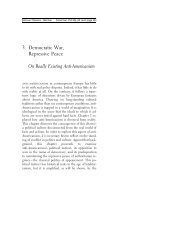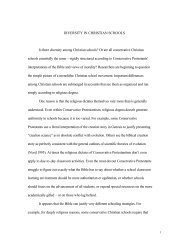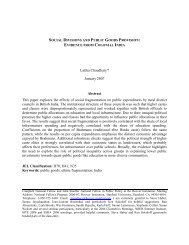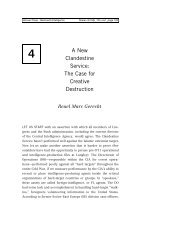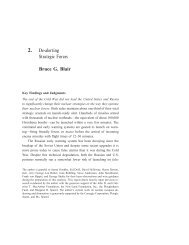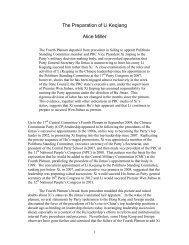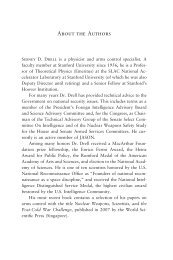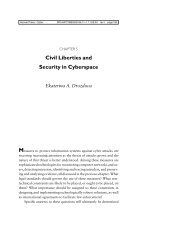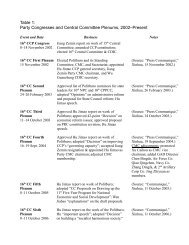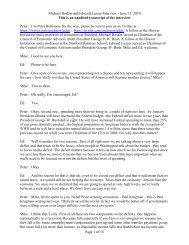The Meaning of Equality - Hoover Institution
The Meaning of Equality - Hoover Institution
The Meaning of Equality - Hoover Institution
Create successful ePaper yourself
Turn your PDF publications into a flip-book with our unique Google optimized e-Paper software.
<strong>Hoover</strong> Press : Machan (<strong>Equality</strong>) DP5 HPEQUA0100 05-06-01 rev1 page 1<br />
chapter one<br />
<strong>The</strong> <strong>Meaning</strong><br />
<strong>of</strong> <strong>Equality</strong><br />
Nicholas Capaldi<br />
equality is both a descriptive concept and a normative concept.<br />
As a descriptive concept, equality is, by definition, an adjectival<br />
relation between entities that are identical in some specific respect.<br />
No two entities can be identical in all respects, for then they would<br />
not be two entities but the same entity. <strong>The</strong> equality may be one<br />
<strong>of</strong> quantity or quality. <strong>Equality</strong> may be predicated <strong>of</strong> things, persons,<br />
or social entities such as institutions, groups, and so on.<br />
<strong>Equality</strong> is also a normative concept. As a normative concept,<br />
equality is the notion that there is some special respect in which all<br />
human beings are in fact equal (descriptive) but that this factual<br />
equality requires that we treat them in a special way. Special treatment<br />
may mean ensuring identical treatment, or it may mean differential<br />
treatment to restore them to or to aid them in reaching or<br />
realizing the specific factual state.<br />
<strong>Equality</strong> as a normative concept, as we shall soon show, is central<br />
to modern political and social debate. All disagreements about<br />
equality as a normative concept center on (1) factual claims about<br />
the specific sense or senses in which human beings are identical, (2)<br />
what constitutes relevant special treatment, that is, which specific
<strong>Hoover</strong> Press : Machan (<strong>Equality</strong>) DP5 HPEQUA0100 05-06-01 rev1 page 2<br />
2/Nicholas Capaldi<br />
senses carry normative weight, and (3) factual claims about which<br />
public policies are consistent and coherent with and effective in<br />
ensuring the relevant special treatment.<br />
equality in the ancient world<br />
<strong>The</strong> ancients held to an organic and hierarchical conception <strong>of</strong> the<br />
world, one, therefore, that was antiegalitarian. All <strong>of</strong> nature, including<br />
the social world, consists <strong>of</strong> a series <strong>of</strong> interlocking entities,<br />
each with its own built-in goal. Each entity in turn was a means to<br />
the satisfaction <strong>of</strong> a higher-level goal. <strong>The</strong> social world was highly<br />
stratified to reflect differences <strong>of</strong> ability that in turn led to differences<br />
<strong>of</strong> function and a corresponding difference in status. <strong>The</strong><br />
ancient world thus held to the notion <strong>of</strong> a collective good, that is,<br />
a good that was more important than and subsumed all <strong>of</strong> the lesser<br />
goods. This view was reflected in actual social practice, so that even<br />
within Athenian democracy, women, slaves, and aliens were excluded<br />
from citizenship. <strong>The</strong> collective good consisted <strong>of</strong> the survival<br />
<strong>of</strong> the city as an internally self-ruled entity. It was the city, or<br />
polis, that was the locus <strong>of</strong> freedom, understood as self-rule. Freedom<br />
was not predicated on individuals. Rather, individuals were<br />
fulfilled when they performed their relevant proper function in<br />
maintaining the city’s freedom. No sharp distinction was made<br />
among politics, ethics, and religion. Ultimate fulfillment came<br />
within the political order.<br />
Classical political theorists advanced the same view. In Plato’s<br />
Republic, a just society was identified with a harmonious society,<br />
and a harmonious society consisted <strong>of</strong> one in which the division <strong>of</strong><br />
labor was exactly correlated with individual differences <strong>of</strong> ability.<br />
Even when Plato seemingly recognized superior women and advocated<br />
the equality <strong>of</strong> women, many scholars have maintained<br />
that he did so tongue-in-cheek and ultimately stressed the need for<br />
an overriding functional division <strong>of</strong> labor. For Aristotle, equality
<strong>Hoover</strong> Press : Machan (<strong>Equality</strong>) DP5 HPEQUA0100 05-06-01 rev1 page 3<br />
<strong>The</strong> <strong>Meaning</strong> <strong>of</strong> <strong>Equality</strong> /3<br />
meant the “same treatment <strong>of</strong> similar persons,” 1 that is, persons<br />
who had the same status. Aristotle was more concerned that those<br />
who were unequal be treated differently. Moreover, the demand<br />
for equality on the part <strong>of</strong> those who are unequal or inferior leads,<br />
according to Aristotle, to revolution. 2 Among Roman thinkers, the<br />
Stoics asserted a form <strong>of</strong> factual equality in that all men possessed<br />
the rational capacity to grasp the universal order, but the Stoics did<br />
not draw from this any normative conclusions about altering social<br />
status.<br />
medieval world<br />
Christianity is the origin <strong>of</strong> the modern conception <strong>of</strong> equality, but,<br />
as we shall see, its full impact does not come into play until the<br />
Reformation. Christianity proclaimed the equal moral worth <strong>of</strong> all<br />
persons in the eyes <strong>of</strong> God. <strong>Equality</strong> is now understood as intrinsic<br />
to the human condition. It is the special respect in which all human<br />
beings are in fact equal (descriptive).<br />
Christians drew both on Stoic doctrine and the Hebrew notion<br />
from Genesis that all human beings “male and female” were created<br />
in the “image <strong>of</strong> God.” <strong>The</strong> Christian doctrine <strong>of</strong> equality as expressed<br />
by Paul (Galatians 3:26–29) is that “<strong>The</strong>re is neither Jew<br />
nor Greek, there is neither bond nor free, there is neither male nor<br />
female: for ye are all one in Christ Jesus.” This view was repeated<br />
in Colossians 3:10–11. <strong>The</strong>re are echoes <strong>of</strong> this conception <strong>of</strong><br />
equality in Confucianism, Hinduism, and Islam.<br />
<strong>The</strong> question arises as to what specific normative implications<br />
follow from this conception <strong>of</strong> equality in the medieval Christian<br />
context. Recognizing equality among human beings requires that<br />
1. Aristotle, Politics, translated by Benjamin Jowett, in Britannica Great Books,<br />
vol. 9 (Chicago: 1952), VII, 14.<br />
2. Ibid., VI, 1.
<strong>Hoover</strong> Press : Machan (<strong>Equality</strong>) DP5 HPEQUA0100 05-06-01 rev1 page 4<br />
4/Nicholas Capaldi<br />
we treat them in a special way. Special treatment may mean ensuring<br />
identical treatment, or it may mean differential treatment to<br />
restore them to or to aid them in reaching the specific factual state.<br />
To understand how this developed in the medieval Christian<br />
context, we need to recognize the political innovation <strong>of</strong> Christianity.<br />
In the words <strong>of</strong> Eric Voegelin, Christianity dedivinized the<br />
state. That is, Christians denied that ultimate human fulfillment was<br />
to be achieved through participation in the polis. A distinction is<br />
introduced between politics on the one side and religion and ethics<br />
on the other. Fulfillment comes though participation in the<br />
Church. Christians, then, occupy two “cities,” to use Augustine’s<br />
conception. Whereas the role <strong>of</strong> the polis in Aristotle was a positive<br />
one, namely, to help make human beings good or to achieve fulfillment,<br />
the role <strong>of</strong> the state in Augustine’s scheme is negative,<br />
namely, to thwart evil, or what we would call maintain law and<br />
order. Christian liberty consists in the recognition by the state <strong>of</strong><br />
the independent status <strong>of</strong> the Church, and that fulfillment comes<br />
within the spiritual domain. This is the origin <strong>of</strong> the modern conception<br />
<strong>of</strong> limiting the power <strong>of</strong> the state.<br />
Because fulfillment comes by participation within the Church,<br />
Christians have no direct interest in political participation or political<br />
rights such as equality before the law. Christians could technically<br />
even be slaves. Slavery was held to be a consequence <strong>of</strong> sin.<br />
With regard to membership within the Church, Christians still<br />
maintained the classical hierarchical conception. Clergy were distinguished<br />
from laypeople. This was not considered a violation <strong>of</strong><br />
the notion <strong>of</strong> Christian equality because to achieve salvation, the<br />
sacraments needed to be administered by someone in a theologically<br />
superior position. Christians were all equally entitled to the<br />
special treatment <strong>of</strong> receiving the sacraments that paved the way to<br />
eternal salvation in the next life. Non-Christians were all equally<br />
entitled to become Christians and subsequently to receive the sacraments.<br />
<strong>The</strong>y were not all equally entitled to administer the sac-
<strong>Hoover</strong> Press : Machan (<strong>Equality</strong>) DP5 HPEQUA0100 05-06-01 rev1 page 5<br />
<strong>The</strong> <strong>Meaning</strong> <strong>of</strong> <strong>Equality</strong> /5<br />
raments. Moreover, the sacraments could be denied to Christians<br />
who had been excommunicated precisely because they threatened<br />
the independent existence and integrity <strong>of</strong> the Church. Becket’s<br />
conflict with Henry II comes to mind in this context. In short,<br />
Christian equality was seen in the medieval period to require special<br />
treatment understood in a way that led not to identical treatment<br />
but to differential treatment.<br />
Two important consequences <strong>of</strong> Christian equality were the<br />
gradual disappearance <strong>of</strong> slavery in Europe and the fact that the<br />
Church served as the main institution <strong>of</strong> social mobility. When the<br />
issue <strong>of</strong> slavery with regard to the Native Americans in the New<br />
World was debated, it was Aristotle’s argument about natural slaves<br />
that served as the basis for advocating slavery, and it was the Christian<br />
conception <strong>of</strong> the equality <strong>of</strong> all before God that served as the<br />
basis for opposing slavery. It was now thought that someone who<br />
had been baptized, including the native population <strong>of</strong> the Western<br />
Hemisphere, could not be enslaved.<br />
reformation<br />
<strong>Equality</strong> became a central notion with the advent <strong>of</strong> modernity,<br />
specifically the Protestant Reformation. Let us begin with modernity.<br />
<strong>The</strong> difference between the classical viewpoint and the modern<br />
viewpoint is the locus <strong>of</strong> standards. For classical thinkers, including<br />
medieval thinkers, all standards whether <strong>of</strong> truth, goodness, or<br />
beauty were structural features <strong>of</strong> the world external to human<br />
beings. What gave authority to some and not to others was the<br />
belief that some individuals had direct and immediate access to<br />
those external standards (by knowledge or grace). Once those standards<br />
were apprehended, our obligation was to conform to them.<br />
<strong>The</strong> object <strong>of</strong> wisdom was conformity to the natural order <strong>of</strong> the<br />
world.<br />
For modern thinkers, all standards are internal. <strong>The</strong> apprehen-
<strong>Hoover</strong> Press : Machan (<strong>Equality</strong>) DP5 HPEQUA0100 05-06-01 rev1 page 6<br />
6/Nicholas Capaldi<br />
sion <strong>of</strong> these internal standards might lead to contact with a transcendent<br />
and/or external order (as in Descartes), but the initial<br />
apprehension was internal. <strong>The</strong> internality <strong>of</strong> standards was reflected<br />
in areas as diverse as science, where Copernicus made us<br />
aware <strong>of</strong> the relativity <strong>of</strong> perception, and art, where Renaissance<br />
artists gloried in the exploration <strong>of</strong> perspective. Moreover, the apprehension<br />
<strong>of</strong> internal standards required that we conform to them,<br />
but conformity to internal standards came to mean the transformation<br />
<strong>of</strong> the external world to conform to these internal standards.<br />
From commerce to technology to landscape gardening, modernity<br />
led to a transformation <strong>of</strong> the understanding <strong>of</strong> how individuals<br />
relate to the world.<br />
<strong>The</strong> medieval Aristotelian synthesis in which all <strong>of</strong> nature and<br />
humanity were linked in an interlocking series <strong>of</strong> organic associations<br />
arranged in hierarchical order was rejected. Nature was not<br />
an organism but a mechanism created by God, and we as individuals<br />
replicated God’s creativity by transforming the world through<br />
good works (including commerce and industry, not only charity)<br />
inspired by the internally apprehended divine vision. <strong>The</strong>re was no<br />
collective good to be authoritatively apprehended in nature, only a<br />
collection <strong>of</strong> individually apprehended goods whose continuity and<br />
coherence were vouchsafed by God.<br />
In science, in religion, in morals, and in politics, the Aristotelian<br />
hierarchical synthesis was challenged. One <strong>of</strong> the most important<br />
challenges was the rejection <strong>of</strong> the idea <strong>of</strong> natural political hierarchies,<br />
both within the Church and in the secular political sphere.<br />
<strong>The</strong> first and most striking instance was the Protestant attack on the<br />
hierarchical notion <strong>of</strong> the Church. As Luther put it in “To the<br />
Christian Nobility” (1520), “It is pure invention that popes, bishops,<br />
priests and monks are to be called the ‘spiritual estate’ ....<br />
<strong>The</strong>re is really no difference . . . . it is intolerable that in the canon<br />
law so much importance is attached to the freedom, life, property<br />
<strong>of</strong> the clergy . . . . Why are your life and limb, property and honor
<strong>Hoover</strong> Press : Machan (<strong>Equality</strong>) DP5 HPEQUA0100 05-06-01 rev1 page 7<br />
<strong>The</strong> <strong>Meaning</strong> <strong>of</strong> <strong>Equality</strong> /7<br />
so free, and mine not? . . . Whence comes this great distinction<br />
between those who are equally Christian? Only from human laws<br />
and inventions!” 3 Calvin expressed the full political implications <strong>of</strong><br />
Reformation Christian equality. Authority derives from voluntary<br />
agreement among equals to submit—this is first confined to the<br />
organization <strong>of</strong> the Church and then extended to the entire political<br />
sphere. Anabaptists, most notably Thomas Münzer, went even<br />
further and asserted complete social equality to be achieved by<br />
violence if necessary. In short, modern egalitarianism originated in<br />
the Christian notion <strong>of</strong> equality as reflected within the context <strong>of</strong><br />
other modern institutions and practices.<br />
<strong>The</strong> so-called Protestant work ethic promoted the notion <strong>of</strong> the<br />
inner-directed individual, an emphasis on work or achievement,<br />
equality before the law and differentiation based on achievement.<br />
<strong>The</strong> insistence on equality before the law was an expression <strong>of</strong> the<br />
notion <strong>of</strong> Christian liberty. In rejecting a hierarchical conception<br />
<strong>of</strong> the world, Protestants could acquiesce in an arrangement in<br />
which the political realm was not subordinate to the religious<br />
realm. At the same time, the political realm was obliged to respect<br />
the traditional spiritual realm <strong>of</strong> Christianity. <strong>The</strong> spiritual realm<br />
was now understood in Protestant terms to mean the opportunity<br />
to do God’s work by transforming the world economically and all<br />
<strong>of</strong> its attendant circumstances. <strong>Equality</strong> before the law came to<br />
mean that there should be no legal barriers to economic activity<br />
that did not apply equally to everyone. To place legal barriers to<br />
equal participation in the economic realm was to thwart God’s<br />
plan.<br />
Because not all were equal in their achievement, not all were to<br />
be treated in the same manner. <strong>The</strong>re was to be a meritocracy, but<br />
the meritocracy was a reflection not <strong>of</strong> simple personal merit but <strong>of</strong><br />
3. Martin Luther, “To the Christian Nobility,” in Three Treatises (1520; Reprint,<br />
Philadelphia: Muhlenberg Press 1960), pp. 14–19.
<strong>Hoover</strong> Press : Machan (<strong>Equality</strong>) DP5 HPEQUA0100 05-06-01 rev1 page 8<br />
8/Nicholas Capaldi<br />
divine preordination. It was God, after all, who inspired us and<br />
accounted for the differences in achievement. However, higher<br />
status was more likely to be accompanied by a sense <strong>of</strong> greater<br />
responsibility, not by the privileges <strong>of</strong> self-indulgence.<br />
This specifically Calvinist notion <strong>of</strong> political and legal equality<br />
influenced the Dutch, British, and American Revolutions. <strong>The</strong><br />
Calvinist and Anabaptist influences converged in the English Civil<br />
War, specifically in a group known as the Levellers. <strong>The</strong> Levellers’<br />
membership reflected what we would now call the rising middle<br />
classes—small property owners, tradesmen, artisans, and apprentices.<br />
<strong>The</strong>y produced a vast pamphlet literature in which, among<br />
other things, John Lilburne asserted the notion that no one has<br />
authority without consent. In a famous debate held at Putney (suburb<br />
<strong>of</strong> London) in 1647 with the <strong>of</strong>ficers at the Army Council<br />
meeting, speaking on behalf <strong>of</strong> the Levellers, Colonel Rainborough<br />
asserted that “the poorest he that is in England hath a life to live as<br />
the greatest he”; no one is obliged to obey a government “he hath<br />
not had a voice to put himself under.” 4 An irate Ireton responded<br />
on behalf <strong>of</strong> the <strong>of</strong>ficers that because the poor could outvote the<br />
rich, “why may not those men vote against all property?” Hence<br />
we get the derogatory expression Levellers, although this was certainly<br />
a misrepresentation <strong>of</strong> their views. <strong>The</strong> Levellers, being serious<br />
Protestants, wanted to deny the franchise to all those whom<br />
they considered lacking in moral independence, such as almstakers<br />
and house servants.<br />
A much more radical group were the so-called Diggers. <strong>The</strong>ir<br />
spokesperson Gerrard Winstanley rejected private property as a reflection<br />
<strong>of</strong> original sin and claimed that “one man hath as much<br />
4. Statement made at the Agreement at Putney (October 1647). Quoted in<br />
the Encyclopaedia Britannica, vol. 29, 15th ed. (1986), p. 62.
<strong>Hoover</strong> Press : Machan (<strong>Equality</strong>) DP5 HPEQUA0100 05-06-01 rev1 page 9<br />
<strong>The</strong> <strong>Meaning</strong> <strong>of</strong> <strong>Equality</strong> /9<br />
rights to the earth as another.” 5 He attributed the existence <strong>of</strong> poverty<br />
to exploitation by the rich, and advocated a form <strong>of</strong> agrarian<br />
communism.<br />
<strong>The</strong> difference between the Levellers and the Diggers is a significant<br />
one and heralds an ongoing dialectic in the development <strong>of</strong><br />
modern notions <strong>of</strong> equality. We might designate this as the difference<br />
between a relative equality and an absolute equality. Relative<br />
egalitarianism is the position that some specific existing practice or<br />
institution is unjust because it fosters inequality <strong>of</strong> treatment based<br />
on irrelevant differences. Absolute egalitarianism is the advocacy <strong>of</strong><br />
a total equality that seems to entail a collective conception <strong>of</strong> the<br />
good in which the individual good is subsumed.<br />
What the Levellers challenged was the political power structure<br />
and not the economic and social system. <strong>The</strong>ir challenge was a<br />
consistent expression both <strong>of</strong> the religious dimension <strong>of</strong> Calvinism<br />
and <strong>of</strong> the commitment to doing God’s work in an increasingly<br />
market-oriented society. <strong>The</strong> Diggers, on the other hand, reflected<br />
the medieval Anabaptist call for complete equality within a feudal<br />
agrarian economy still committed to the notion <strong>of</strong> a collective<br />
good. <strong>The</strong> Levellers adhered to the Platonic-Augustinian insight<br />
that we live in two cities so that given original sin this world would<br />
always be an imperfect reflection <strong>of</strong> the City <strong>of</strong> God. Poverty was<br />
a result <strong>of</strong> a lack <strong>of</strong> moral independence that, in turn, was a result<br />
<strong>of</strong> original sin. <strong>The</strong> Diggers asserted the immanentization <strong>of</strong> the<br />
eschaton, so that not only were individuals not responsible for their<br />
own poverty but also that some sort <strong>of</strong> social utopia was possible<br />
here on earth.<br />
Protestants during this period saw an important connection between<br />
politics and economics. <strong>The</strong> desire for political equality, that<br />
5. Quoted from G. L. Abernethy, <strong>The</strong> Idea <strong>of</strong> <strong>Equality</strong>: An Anthology (Richmond,<br />
Va.: John Knox Press, 1959). (Quote originally appeared in “Truth Lifting<br />
Up Its Head Above Scandals,” 1649.)
<strong>Hoover</strong> Press : Machan (<strong>Equality</strong>) DP5 HPEQUA0100 05-06-01 rev1 page 10<br />
10 / Nicholas Capaldi<br />
is, government by consent, did not reflect any desire to exercise<br />
power for power’s sake or to remake society. On the contrary,<br />
Protestants were largely focused on protecting the private sphere<br />
and the spiritual dimension from political corruption. Rather the<br />
connection they perceived between politics and economics derived<br />
from the fact that government controlled large parts <strong>of</strong> the economy<br />
(granting privileges such as monopolies, sinecures, land grants,<br />
etc.) so that political equality led to economic equality. Economic<br />
equality meant the liberty to pursue God’s work in this world, not<br />
an equal distribution <strong>of</strong> the spoils. Part <strong>of</strong> that political equality was<br />
equality before the law.<br />
Both Hobbes and Locke articulated doctrines <strong>of</strong> natural right<br />
and social contract that reflect this Protestant framework. <strong>The</strong><br />
modern doctrine <strong>of</strong> natural right replaced the medieval doctrine <strong>of</strong><br />
natural law as the fundamental bulwark against political oppression.<br />
In a nonteleological universe, natural law had lost its meaning. <strong>The</strong><br />
classical idea <strong>of</strong> law is that it is a command from an authoritative<br />
source external to humanity. <strong>The</strong> modern idea <strong>of</strong> law is that it is a<br />
directive from an authoritative source internal to humanity. <strong>The</strong><br />
physical world <strong>of</strong> modern science is mechanistic and not teleological;<br />
natural law in the normative sense can no longer be intelligibly<br />
applied to both the human and physical world. Teleology is to be<br />
found only within the human world. This is the origin <strong>of</strong> natural<br />
rights. <strong>The</strong> starting point (ontologically, axiologically, and epistemologically)<br />
is individualism. From this individualism we deduce<br />
conclusions about the social world. In its Lockean formulation,<br />
individualism reflected a Protestant moral and religious conception<br />
<strong>of</strong> the relation between the individual and God. Each individual<br />
was alleged to have a built-in end or set <strong>of</strong> such consistent ends. In<br />
its original Lockean formulation, these ends (e.g., life, liberty, and<br />
property) were designated as rights (qualified as natural, human,<br />
etc.); they were teleological. Rights, so understood, were absolute,<br />
did not conflict, and were possessed only by individual human
<strong>Hoover</strong> Press : Machan (<strong>Equality</strong>) DP5 HPEQUA0100 05-06-01 rev1 page 11<br />
<strong>The</strong> <strong>Meaning</strong> <strong>of</strong> <strong>Equality</strong> /11<br />
beings. Rights were morally absolute or fundamental because they<br />
were derived from human nature and God (or later the categorical<br />
imperative), and as such could not be overridden; the role <strong>of</strong> these<br />
rights was to protect the human capacity to choose. Finally, such<br />
rights imposed only duties <strong>of</strong> noninterference.<br />
enlightenment and the french revolution<br />
Enlightenment 6 is a term used broadly by historians <strong>of</strong> ideas to refer<br />
to the intellectual and social ferment in Western Europe during the<br />
eighteenth century. Our intention is not to generalize about this<br />
entire period but to identify a specific, salient project that we shall<br />
call the Enlightenment Project. What do we mean by the Enlightenment<br />
Project? <strong>The</strong> Enlightenment Project is the attempt to define<br />
and explain the human predicament through science as well as<br />
to achieve mastery over it through the use <strong>of</strong> a social technology.<br />
This project originated in France in the eighteenth century with<br />
the philosophes. <strong>The</strong> most influential among them were d’Alembert,<br />
La Mettrie, Condillac, Helvétius, d’Holbach, Turgot, Condorcet,<br />
Cabanis, and Voltaire.<br />
Isaiah Berlin characterizes the Project as follows:<br />
[T]here were certain beliefs that were more or less common to the<br />
entire party <strong>of</strong> progress and civilization, and this is what makes it<br />
proper to speak <strong>of</strong> it as a single movement. <strong>The</strong>se were, in effect,<br />
the conviction that the world, or nature, was a single whole, subject<br />
to a single set <strong>of</strong> laws, in principle discoverable by the intelligence<br />
<strong>of</strong> man; that the laws which governed inanimate nature were in<br />
principle the same as those which governed plants, animals and<br />
sentient beings; that man was capable <strong>of</strong> improvement; that there<br />
existed certain objectively recognizable human goals which all men,<br />
6. Much <strong>of</strong> this discussion <strong>of</strong> the Enlightenment is taken from Nicholas<br />
Capaldi, <strong>The</strong> Enlightenment Project in the Analytic Conversation (Boston: Kluwer,<br />
1998), chapter one.
<strong>Hoover</strong> Press : Machan (<strong>Equality</strong>) DP5 HPEQUA0100 05-06-01 rev1 page 12<br />
12 / Nicholas Capaldi<br />
rightly so described, sought after, namely, happiness, knowledge,<br />
justice, liberty, and what was somewhat vaguely described but well<br />
understood as virtue; that these goals were common to all men as<br />
such, were not unattainable, nor incompatible, and that human misery,<br />
vice and folly were mainly due to ignorance either <strong>of</strong> what<br />
these goals consisted in or <strong>of</strong> the means <strong>of</strong> attaining them—ignorance<br />
due in turn to insufficient knowledge <strong>of</strong> the laws <strong>of</strong> nature.<br />
. . . Consequently, the discovery <strong>of</strong> general laws that governed<br />
human behaviour, their clear and logical integration into scientific<br />
systems <strong>of</strong> psychology, sociology, economics, political science and<br />
the like (though they did not use these names)—and the determination<br />
<strong>of</strong> their proper place in the great corpus <strong>of</strong> knowledge that<br />
covered all discoverable facts, would, by replacing the chaotic amalgam<br />
<strong>of</strong> guesswork, tradition, superstition, prejudice, dogma, fantasy<br />
and “interested error” that hitherto did service as human knowledge<br />
and human wisdom (and <strong>of</strong> which by far the chief protector and<br />
instigator was the Church), create a new, sane, rational, happy, just<br />
and self-perpetuating human society, which, having arrived at the<br />
peak <strong>of</strong> attainable perfection, would preserve itself against all hostile<br />
influences, save perhaps those <strong>of</strong> nature.” 7<br />
Randall identifies the intellectual origins <strong>of</strong> the project as follows:<br />
“Voltaire and his successors took over and used four main<br />
bodies <strong>of</strong> English ideas. First, there was Newtonian science, which<br />
was developed in France into a thoroughgoing materialism. Secondly,<br />
there was natural religion, or Deism, which the French<br />
pushed to atheism. Thirdly, there was Locke and British empiricism,<br />
which became theoretically a thoroughgoing sensationalism,<br />
and practically the omnipotence <strong>of</strong> the environment. Finally, there<br />
were British political institutions as interpreted by Locke, the apologist<br />
for 1688, which became the basis <strong>of</strong> the political theories <strong>of</strong><br />
the Revolution.” 8<br />
7. I. Berlin, <strong>The</strong> Magus <strong>of</strong> the North: J. G. Hamann and the Origins <strong>of</strong> Modern<br />
Irrationalism (London: John Murray, 1993), pp. 27–28.<br />
8. J. H. Randall, <strong>The</strong> Career <strong>of</strong> Philosophy (New York: Columbia University<br />
Press, 1962), p. 862.
<strong>Hoover</strong> Press : Machan (<strong>Equality</strong>) DP5 HPEQUA0100 05-06-01 rev1 page 13<br />
<strong>The</strong> <strong>Meaning</strong> <strong>of</strong> <strong>Equality</strong> /13<br />
This project had three philosophical elements: metaphysical,<br />
epistemological, and axiological.<br />
Metaphysically, the philosophes who formulated the Enlightenment<br />
Project were philosophic naturalists: they asserted both that<br />
the physical world was the only reality and that it could be explained<br />
exclusively by modern natural science. La Mettrie’s<br />
L’Homme machine (1747) specifically aimed to reduce mental processes<br />
to their physiological causes. La Mettrie openly declared<br />
atheism:<br />
<strong>The</strong> universe will never be happy, unless it is atheistic. . . . If atheism<br />
were generally accepted, all the forms <strong>of</strong> religion would then be<br />
destroyed and cut <strong>of</strong>f at the roots. . . . Deaf to all other voices,<br />
tranquil mortals would follow only the spontaneous dictates <strong>of</strong> their<br />
own being, the only commands which can never be despised with<br />
impunity and which alone can lead us to happiness. . . . Let us then<br />
conclude boldly that man is a machine, and that in the whole universe<br />
there is but a single substance differently modified.” 9<br />
Its epistemology is Aristotle’s and Locke’s epistemology without<br />
a soul or an active intellect. <strong>The</strong> product <strong>of</strong> this is empiricism.<br />
Following Locke, Condillac was led to engage in analysis, the<br />
breaking down <strong>of</strong> the contents <strong>of</strong> the human mind into elementary<br />
units and then reconstituting or ordering those units into a whole.<br />
<strong>The</strong> whole was to be understood in terms <strong>of</strong> its constituent and<br />
separable parts. Departing from Locke, Condillac suggested that<br />
sensory impressions could give rise to all <strong>of</strong> our mental operations<br />
without reference to a self or active intellect. Cabanis summarizes<br />
the connection between the metaphysics and the epistemology as<br />
follows: “We are doubtless not still required to prove that physical<br />
sensibility is the source <strong>of</strong> all the ideas and <strong>of</strong> all the habits which<br />
constitute the moral existence <strong>of</strong> man: Locke, Bonnet, Condillac,<br />
9. J. A. La Mettrie, L’Homme machine, edited by A. Vartanian (Princeton:<br />
Princeton University Press, 1960), pp. 175–76.
<strong>Hoover</strong> Press : Machan (<strong>Equality</strong>) DP5 HPEQUA0100 05-06-01 rev1 page 14<br />
14 / Nicholas Capaldi<br />
Helvétius have carried this truth to the last degree <strong>of</strong> demonstration.”<br />
10<br />
Its axiology can be characterized as natural right, without God.<br />
Morality, according to Condillac, arises as a refinement <strong>of</strong> volitional<br />
operations that originate from a combination <strong>of</strong> both internal and<br />
external physical stimuli without the interposition <strong>of</strong> an agent. Earlier,<br />
La Mettrie, in L’Homme machine, denied free will in favor <strong>of</strong><br />
determinism, but he also asserted that human materialism gave rise,<br />
in a manner never explained, to an internal teleology characterized<br />
by a hierarchy <strong>of</strong> values. This internal teleology could be perfected<br />
by a kind <strong>of</strong> medical technology. In his Discours sur le bonheur<br />
(1750), La Mettrie described the highest good as the maximization<br />
<strong>of</strong> the pleasurable well-being <strong>of</strong> the human machine. In his 1776<br />
publication, Le Commerce et le gouvernement considérés relativement l’un<br />
à l’autre, Condillac argued against mercantilism in favor <strong>of</strong> free trade<br />
and maintained that reason would discover social laws endorsing<br />
private property.<br />
Condillac and Helvétius used the doctrine <strong>of</strong> environmental determinism<br />
to reinforce the doctrine <strong>of</strong> natural equality. Natural<br />
equality was now understood in purely secular terms so that human<br />
beings were alleged to be naturally good. <strong>The</strong>se two doctrines imply<br />
a third doctrine, perfectibility. This is the scientific or socialscientific<br />
origin <strong>of</strong> equality.<br />
<strong>The</strong> naturalistic-mechanistic worldview allows for a social technology<br />
that could in principle solve all human problems. Hence,<br />
we see the enthusiasm for mechanistic science. Mechanistic views<br />
<strong>of</strong> human nature are attractive because they are compatible with<br />
the idea that human beings are both a tabula rasa and fundamentally<br />
good. Hence, human beings could be either caused to be good, or<br />
obstacles to their natural goodness could be removed. It was no<br />
10. P.J.G. Cabanis, Rapports du physique et du moral de l’homme, vol. 1, 2d ed.<br />
(Paris, 1805), pp. 39, 85.
<strong>Hoover</strong> Press : Machan (<strong>Equality</strong>) DP5 HPEQUA0100 05-06-01 rev1 page 15<br />
<strong>The</strong> <strong>Meaning</strong> <strong>of</strong> <strong>Equality</strong> /15<br />
accident that freedom in the modern world came to be defined, in<br />
one version, as the absence <strong>of</strong> external constraints. In an analogous<br />
way, rationality could seemingly be promoted either mechanically<br />
or by removing constraints such as the belief in religion, authority,<br />
custom, or tradition. This has the added benefit <strong>of</strong> reinforcing the<br />
progressive-scientific story by seemingly providing a naturalistic<br />
account <strong>of</strong> why it has taken so long to arrive at the truth <strong>of</strong> the<br />
Enlightenment Project.<br />
Given the economic and social challenges <strong>of</strong> the modern world,<br />
it seemed to many <strong>of</strong> those impatient to alter the status quo that a<br />
wholesale rejection <strong>of</strong> authority, tradition, and the religious institutions<br />
that seemed to support the status quo was the quickest way<br />
to achieve reform, hence, the enthusiasm for a seemingly liberated<br />
reason. Because traditional institutions had justified themselves on<br />
the grounds that they embodied a certain wisdom about human<br />
shortcomings, mechanistic theories about the natural goodness <strong>of</strong><br />
human nature would seem doubly attractive to critics <strong>of</strong> the status<br />
quo.<br />
Enlightenment psychology in particular and programmatic Enlightenment<br />
social science in general were not the product <strong>of</strong> an<br />
explication <strong>of</strong> the actual empirical accomplishments <strong>of</strong> the social<br />
sciences. Rather, these were conclusions from unargued philosophical<br />
premises and a political agenda. In practice, this led to two<br />
programs: either a militant reductivism or a miraculous functional<br />
dualism. By functional dualism is meant the contention that physical<br />
processes at one level were perfectly coordinated with conscious<br />
processes at another level, that is, a dualism <strong>of</strong> mechanism and<br />
teleology. This dualism is “miraculous” because without some appeal<br />
to God, it is difficult to see why a deterministic system should<br />
also function coincidentally as a teleological one. Locke believed<br />
that God could make matter “think,” but within the Enlightenment<br />
Project no appeal to theistic notions was permitted. So, just<br />
as the Enlightenment Project required a providential history with-
<strong>Hoover</strong> Press : Machan (<strong>Equality</strong>) DP5 HPEQUA0100 05-06-01 rev1 page 16<br />
16 / Nicholas Capaldi<br />
out God, so it required a miraculous psychological dualism without<br />
God. <strong>The</strong> Enlightenment Project never succeeded in explaining,<br />
either in its epistemology or in its psychology, how the human<br />
subject could be understood without appeal to teleology <strong>of</strong> some<br />
kind and at some level.<br />
This is important for the consideration <strong>of</strong> equality. Earlier we<br />
noted that equality was the notion that there was some special<br />
respect in which all human beings were in fact equal (descriptive);<br />
this definition <strong>of</strong> equality has normative implications. In a teleological<br />
system, all facts do carry normative weight. For example, if it is<br />
a fact that our built-in end or purpose or goal is to achieve or reach<br />
a certain condition, then it makes sense to say that we ought to act<br />
consistently with the achievement <strong>of</strong> that condition. In a mechanical<br />
or deterministic system, there are no natural goals, merely states<br />
<strong>of</strong> affairs and, in the human case, drives. It is not clear what it would<br />
mean to say that we ought to act in order to satisfy a drive. <strong>The</strong><br />
drive operates on its own, and it is either powerful enough or<br />
“lucky” enough to prevail or it is not.<br />
<strong>The</strong>re is one unusually disturbing and perplexing axiological<br />
problem for the Enlightenment Project. That problem is the loss <strong>of</strong><br />
the self. As we stressed in our discussion <strong>of</strong> epistemology, proponents<br />
<strong>of</strong> the Enlightenment Project denied the existence <strong>of</strong> an active<br />
intellect with special and unique functions. As we stressed in<br />
our discussion <strong>of</strong> both metaphysics and epistemology, proponents<br />
<strong>of</strong> the Enlightenment Project denied the existence <strong>of</strong> a subject that<br />
was not an object or not reducible to a collection <strong>of</strong> objects. Most<br />
especially, this amounted to the denial <strong>of</strong> the idea <strong>of</strong> the free and<br />
personally responsible individual soul that emerged out <strong>of</strong> the<br />
Greco-Roman and Judeo-Christian worldview.<br />
<strong>The</strong> denial <strong>of</strong> the self thus serves a number <strong>of</strong> important and<br />
interrelated purposes for the Enlightenment Project. Metaphysically<br />
it reinforces the claim that the physical world is primary. In a
<strong>Hoover</strong> Press : Machan (<strong>Equality</strong>) DP5 HPEQUA0100 05-06-01 rev1 page 17<br />
<strong>The</strong> <strong>Meaning</strong> <strong>of</strong> <strong>Equality</strong> /17<br />
very important sense, the entire Western intellectual tradition prior<br />
to the Enlightenment had made self-understanding primary. Coincidentally<br />
it is a further attack on the theistic contention <strong>of</strong> a<br />
unique volitional being. Epistemologically, the denial <strong>of</strong> the self<br />
reinforces the claim that knowledge is nothing but the grasping <strong>of</strong><br />
an external structure. Failure to grasp the structure cannot be attributed<br />
to any act <strong>of</strong> the will but becomes in principle explainable in<br />
terms <strong>of</strong> further objective structures. This gives a tremendous boost<br />
to rationalist optimism. Finally, the denial <strong>of</strong> the self serves the<br />
axiological function <strong>of</strong> providing for an objective social technology<br />
that does not depend on human attitudes that are not externally<br />
manipulable. Put in other terms, intellectual virtue would not depend<br />
on moral virtue, nor could there be a failure <strong>of</strong> the will, and<br />
there would be no problem <strong>of</strong> freedom <strong>of</strong> the will.<br />
In its origins, the Enlightenment Project was intended to provide<br />
a secular rationale for liberal culture. By liberal culture is meant the<br />
concatenation <strong>of</strong> the technological project (conquest <strong>of</strong> nature),<br />
market economies, limited government, rule <strong>of</strong> law, individual<br />
rights, and toleration. <strong>The</strong>re were two different endorsements. <strong>The</strong><br />
first view, which is the origin <strong>of</strong> methodological individualism,<br />
assumed the truths <strong>of</strong> physicalism, empiricism, associationism, and<br />
intellectual hedonism. Because human nature partakes <strong>of</strong> the natural<br />
harmony <strong>of</strong> the universe, enlightened self-interest implies that<br />
human beings can manage their own affairs without government<br />
interference. As Randall put it:<br />
[S]ensationalism, associationism, hedonism, and intellectualism<br />
were ostensibly the outcome <strong>of</strong> a mechanical analysis <strong>of</strong> human<br />
nature. Actually, they were dictated by the demands <strong>of</strong> the middle<br />
class for social change. <strong>The</strong>y became the philosophic justification <strong>of</strong><br />
nineteenth-century British Liberalism, its method <strong>of</strong> criticizing traditional<br />
institutions, by their consequences in individual pleasures
<strong>Hoover</strong> Press : Machan (<strong>Equality</strong>) DP5 HPEQUA0100 05-06-01 rev1 page 18<br />
18 / Nicholas Capaldi<br />
and pains. <strong>The</strong>y provided a rational basis for a society <strong>of</strong> laissez-faire<br />
and free competition, the trust in the reason <strong>of</strong> the common man.” 11<br />
<strong>The</strong>re is a second version <strong>of</strong> how the Enlightenment Project<br />
endorsed liberal culture. Philosophes such as Voltaire, Diderot,<br />
d’Alembert, and the physiocrats (Gournay, Quesnay, Turgot, and<br />
Dupont de Nemours) took their cue from Bacon. This latter group<br />
advocated not only the idea <strong>of</strong> the conquest <strong>of</strong> nature but also the<br />
idea <strong>of</strong> a social technology to solve all social and political problems.<br />
<strong>The</strong>y equated this program with a powerful central government<br />
unencumbered by the Church, the courts, or legislative bodies.<br />
That is, they eschewed limited government. This second version is<br />
also avowedly liberal, but it would despite itself evolve into totalitarianism.<br />
<strong>The</strong> clearest example <strong>of</strong> this is to be found in Helvétius’ De<br />
l’Esprit (1758). Starting with Locke’s epistemological claim that all<br />
knowledge originates in experience and that the human mind at<br />
birth is a tabula rasa, Helvétius goes on to embrace an extreme form<br />
<strong>of</strong> environmental determinism. This should remind us <strong>of</strong> Rawls’<br />
veil <strong>of</strong> ignorance. All differences in beliefs, attitudes, values, and so<br />
forth are solely the result <strong>of</strong> historical and environmental accident. 12<br />
From this, it was concluded that all human beings were fundamentally<br />
identical and therefore equal. All forms <strong>of</strong> social hierarchy,<br />
privilege, and differences in power and influence were deemed the<br />
result <strong>of</strong> historical accident and denounced as unjust. In their place<br />
was substituted the notion that all individuals, when properly educated,<br />
were equally competent judges. Participatory democracy is<br />
therefore the only form <strong>of</strong> government compatible with the fundamental<br />
equality <strong>of</strong> human nature.<br />
11. Randall, <strong>The</strong> Career <strong>of</strong> Philosophy, p. 924.<br />
12. “Even the willingness to make an effort, to try, and so to be deserving in<br />
the ordinary sense is itself dependent upon happy family and social circumstances.”<br />
John Rawls, A <strong>The</strong>ory <strong>of</strong> Justice (Cambridge: Harvard University Press,<br />
1971), p. 74.
<strong>Hoover</strong> Press : Machan (<strong>Equality</strong>) DP5 HPEQUA0100 05-06-01 rev1 page 19<br />
<strong>The</strong> <strong>Meaning</strong> <strong>of</strong> <strong>Equality</strong> /19<br />
What Helvétius did not see was that his reading <strong>of</strong> Locke was<br />
also compatible with totalitarianism. First, if there were basic truths<br />
about human nature that dictated specific social arrangements then<br />
why should these practices not be forthwith instituted by a dictatorial<br />
and enlightened elite? Further, the people were to be trusted<br />
only if they were properly educated and had undergone a deprogramming<br />
therapy that cleansed them <strong>of</strong> the misperceptions from<br />
which they suffered as the result <strong>of</strong> previous oppressive governments.<br />
Allowing the people to debate public policy issues in their<br />
current state <strong>of</strong> mind ran the risk <strong>of</strong> their intellectual exploitation<br />
by scoundrels. It might be necessary to have a temporary dictatorship<br />
until the therapeutic process was completed, and even then<br />
political debate could be dispensed with in favor <strong>of</strong> scientific discussion<br />
among the informed experts followed by public reeducation.<br />
Environmental determinism had also to be qualified by and<br />
made compatible with the assumption that a secularized natural law<br />
would continue to discover that all human beings shared the same<br />
basic goals. When these goals had been presumed to originate with<br />
God, as was the case in Locke and traditional natural law, it was not<br />
necessary to explain (1) why there were goals in the first place, (2)<br />
why these goals were common and universal to all human beings,<br />
and (3) why these goals could harmoniously coexist both within<br />
the same individual and among an entire community. Moreover,<br />
within traditional theologically based versions <strong>of</strong> natural law some<br />
consideration had been given to the inner conflicts we all experience<br />
and to potential social conflicts. Perfect justice was to be<br />
achieved in the next life, so that all we could hope for in this world<br />
was a harmony <strong>of</strong> private interests. When natural law is shorn <strong>of</strong> its<br />
theological framework, it becomes problematic why human beings<br />
should be believed to have natural goals at all, especially given a<br />
commitment to strong environmental determinism. It also becomes<br />
problematic to assume that if there were goals, they would
<strong>Hoover</strong> Press : Machan (<strong>Equality</strong>) DP5 HPEQUA0100 05-06-01 rev1 page 20<br />
20 / Nicholas Capaldi<br />
be common to all human beings, especially in the presence <strong>of</strong> differing<br />
histories. Finally, and most important, how can there be<br />
scientific public policy and social reconstruction unless there is<br />
some natural harmony or guarantee <strong>of</strong> a lack <strong>of</strong> ultimate conflict?<br />
Once the belief in God is surrendered, the adherence to a secularized<br />
natural law doctrine requires some substitute to guarantee<br />
the convergence toward a common interest. <strong>The</strong> logic <strong>of</strong> the argument<br />
will inevitably drive theorists to the conclusion that there<br />
must be a common or group interest that subsumes all <strong>of</strong> the individual<br />
interests so that ultimate fulfillment on the part <strong>of</strong> the individual<br />
can be achieved only within some absolute social and political<br />
framework. Modern totalitarianism is thus born. In that pivotal<br />
work, What Is the Third Estate?, the Abbe Sieyes had asserted that<br />
the nation “is prior to everything. It is the source <strong>of</strong> everything.<br />
. . . its will is always the supreme law.”<br />
Totalitarian democracy substitutes the idea <strong>of</strong> a collective good<br />
for the traditional idea <strong>of</strong> a harmony <strong>of</strong> interests. At the same time,<br />
it seemingly solves one <strong>of</strong> the serious problems <strong>of</strong> the new secularized<br />
natural law. Instead <strong>of</strong> having to establish that each individual<br />
has a built-in goal (as opposed to a historically acquired one) and<br />
instead <strong>of</strong> having to prove that each individual’s natural goal is<br />
compatible with those <strong>of</strong> every other individual, the new totalitarian<br />
has merely to establish what the common goal is. Establishing<br />
this common goal was never done in any objective or scientific<br />
way, despite the scientific pretensions <strong>of</strong> the age. Instead, each and<br />
every revolutionary individual or faction was free to propose whatever<br />
was wanted.<br />
<strong>The</strong> second version <strong>of</strong> the Enlightenment Project leads to a<br />
transformation <strong>of</strong> the Lockean conception <strong>of</strong> rights. In its Enlightenment<br />
Project form, the ends are not rights; rather, rights are<br />
means to the achievement <strong>of</strong> the ends. As such, rights are only<br />
prima facie, may be overridden, and may be possessed by any entity,<br />
not only individual human beings. Such rights can be welfare
<strong>Hoover</strong> Press : Machan (<strong>Equality</strong>) DP5 HPEQUA0100 05-06-01 rev1 page 21<br />
<strong>The</strong> <strong>Meaning</strong> <strong>of</strong> <strong>Equality</strong> /21<br />
rights, that is, they may be such that others have a positive obligation<br />
to provide such goods, benefits or means. What distinguishes<br />
one social philosopher from another is (1) whether rights are understood<br />
to be absolute or prima facie, (2) the content <strong>of</strong> the rights,<br />
and (3) the lexical ordering <strong>of</strong> those rights.<br />
All <strong>of</strong> the difficulties we have enumerated in the Enlightenment<br />
Project had been foreseen. Perhaps the most insightful critic <strong>of</strong> this<br />
kind <strong>of</strong> egalitarianism was David Hume. In one prescient paragraph<br />
in the Enquiry Concerning the Principles <strong>of</strong> Morals, 13 Hume stated the<br />
entire case against it. First, there was no agreement on what things<br />
should be equalized; that is, there was no consensus on which universal<br />
facts about human nature entailed normative social arrangements.<br />
Second, given that lack <strong>of</strong> agreement, demands for equality<br />
would remain nothing more than rhetorical masks for private political<br />
agendas. Third, even if it were possible to redistribute everything<br />
so that we all started out equal, differences in ability and<br />
circumstances (e.g., luck) would soon lead to inequalities. Fourth,<br />
and finally, to overcome the inegalitarian recidivism, it would be<br />
necessary to maintain the most all-encompassing social tyranny.<br />
Notice that Hume is not objecting to equality before the law or<br />
equality <strong>of</strong> opportunity, forms <strong>of</strong> equality he supported. He supported<br />
them because they were part and parcel <strong>of</strong> a market economy<br />
in a commercial republic, that is, what we have called liberal<br />
culture. What he objected to was the allegedly scientific openended<br />
egalitarianism <strong>of</strong> the Enlightenment Project. Something new<br />
was also introduced in Hume’s argument. <strong>The</strong> point <strong>of</strong> encouraging<br />
equality <strong>of</strong> opportunity is to maximize growth and the creation<br />
<strong>of</strong> greater opportunities, economic and otherwise, for everyone.<br />
<strong>The</strong> secular concern for growth has replaced the Reformation notion<br />
<strong>of</strong> doing God’s work.<br />
13. David Hume, Enquiry Concerning the Principles <strong>of</strong> Morals (Oxford: Clarendon<br />
Press, 1972), p. 194.
<strong>Hoover</strong> Press : Machan (<strong>Equality</strong>) DP5 HPEQUA0100 05-06-01 rev1 page 22<br />
22 / Nicholas Capaldi<br />
Nor was Hume alone in making such objections. Diderot dissented<br />
from Helvétius on the grounds that there were innate differences<br />
<strong>of</strong> ability as well as environmental influences. Probably neither<br />
the advocates <strong>of</strong> the Enlightenment Project nor their critics<br />
envisioned a genetic engineering that could presumably equalize<br />
genetic makeup.<br />
Both Montesquieu and Edmund Burke shared one <strong>of</strong> Hume’s<br />
concerns, the threat <strong>of</strong> tyranny. Both had maintained that some<br />
forms <strong>of</strong> social and economic hierarchy were a defense against tyranny,<br />
understood as the existence <strong>of</strong> a social order in which there<br />
were no intermediate institutions between isolated individuals and<br />
an all-powerful government needed to preserve the equality <strong>of</strong> the<br />
isolated individuals. This concern for a potential conflict between<br />
liberty and equality would resurface in the next century.<br />
Rousseau represented an important and <strong>of</strong>ten overlooked and<br />
misunderstood countercurrent to the Enlightenment Project.<br />
Against the denial <strong>of</strong> the existence <strong>of</strong> a moral self, Rousseau reasserted<br />
it. Essentially he revived the Christian conception <strong>of</strong> the<br />
dignity <strong>of</strong> the individual soul but in a secular way. <strong>The</strong> kind <strong>of</strong><br />
equality that counted, for him, was moral equality. He did recognize<br />
that this kind <strong>of</strong> equality could be threatened by economic<br />
inequality (Discourse on the Origins <strong>of</strong> Inequality in 1754) and in the<br />
Social Contract <strong>of</strong> 1762, where he urged that no one be “so rich as<br />
to be able to buy another, and none so poor as to have to sell<br />
himself.” 14 However, he did not press for equality <strong>of</strong> political representation<br />
nor did he advocate the abolition <strong>of</strong> private property.<br />
Rather, he urged that there be something like an equal participation<br />
in the public good (general will).<br />
Rousseau’s views were developed by Kant into the notion <strong>of</strong><br />
14. Jean-Jacques Rousseau, “Social Contract,” in Political Writings <strong>of</strong> J. J.<br />
Rousseau, edited by C. E. Vaughan (Cambridge, 1915), 2 vols.
<strong>Hoover</strong> Press : Machan (<strong>Equality</strong>) DP5 HPEQUA0100 05-06-01 rev1 page 23<br />
<strong>The</strong> <strong>Meaning</strong> <strong>of</strong> <strong>Equality</strong> /23<br />
autonomy and later by Hegel in the much more sophisticated reconciliation<br />
<strong>of</strong> civil society with the notion <strong>of</strong> a state. <strong>The</strong>se views<br />
are reflected both in the current advocacy <strong>of</strong> self-respect and in the<br />
advocacy <strong>of</strong> self-esteem, about which we shall have more to say<br />
later. Even Bentham’s utilitarian notion that each individual is to<br />
count as one and no more than one is another secular expression <strong>of</strong><br />
this notion meant to cohabit the same space with the notion that<br />
individuals are only rational maximizers.<br />
<strong>The</strong> French Revolution reflected all <strong>of</strong> the competing conceptions<br />
<strong>of</strong> equality we have identified. <strong>The</strong> Declaration <strong>of</strong> Rights <strong>of</strong><br />
1789 rejected privileges and opportunities based on birth and advocated<br />
equality <strong>of</strong> opportunity (access to public <strong>of</strong>fice should depend<br />
only on “virtues and talents”). It abolished feudalism, provided<br />
for equality <strong>of</strong> rights, equality before the law, equality <strong>of</strong><br />
opportunity (abolished the inheritance <strong>of</strong> rank and public <strong>of</strong>fice),<br />
equality <strong>of</strong> punishment, equality <strong>of</strong> taxation. <strong>The</strong> abolition <strong>of</strong> slavery<br />
was proclaimed in 1794. All <strong>of</strong> this reflected the relative egalitarianism<br />
associated with a commercial republic, and this in turn<br />
reflected a secularized version <strong>of</strong> the Protestant Reformation within<br />
a market economy.<br />
What was the perceived relationship between political equality<br />
and economic equality? <strong>The</strong>re was no call for universal suffrage<br />
(not to be confused with equality before the law). <strong>The</strong> assumption<br />
was that political rights depended on achieving a certain minimal<br />
economic standing (property qualification).<br />
“Grachus” Babeuf, on the other hand, whose first name is meant<br />
to remind us <strong>of</strong> the revolt led by the Grachhi brothers in ancient<br />
Rome, advocated an absolute equality. When informed that some<br />
people were more talented than others, he suggested that their right<br />
hands be cut <strong>of</strong>f to equalize performance! He was the mastermind<br />
behind the Conspiracy <strong>of</strong> the Equals, designed to bring about total<br />
equality <strong>of</strong> outcome. He was executed in 1797.
<strong>Hoover</strong> Press : Machan (<strong>Equality</strong>) DP5 HPEQUA0100 05-06-01 rev1 page 24<br />
24 / Nicholas Capaldi<br />
nineteenth century<br />
Nineteenth-century socialist thought represents a challenge to<br />
eighteenth-century thought on equality. <strong>The</strong> dominant eighteenth-century<br />
view was that political equality should reflect economic<br />
status. Specifically, those who were economically self-sufficient<br />
or capable <strong>of</strong> competing for economic benefits should be<br />
given political equality (equality <strong>of</strong> opportunity to compete, equality<br />
before the law, suffrage). Those who had to work for others in<br />
a fashion reminiscent <strong>of</strong> feudalism were deemed not self-sufficient.<br />
Nineteenth-century socialist thought, by and large, maintained that<br />
workers who appeared lacking in self-sufficiency were denied the<br />
opportunity to become self-sufficient. Economic inequality was<br />
held to be the fundamental inequality in that it was instrumental to<br />
all other forms <strong>of</strong> inequality (power, prestige, self-regard, self-sufficiency,<br />
etc.).<br />
<strong>The</strong> so-called utopian socialists, including J. S. Mill, advocated<br />
ending the inequality <strong>of</strong> a society divided between employers and<br />
employees by making everyone a potential entrepreneur. To<br />
achieve this end, it would be necessary to provide the conditions<br />
for a minimally good life understood as the conditions necessary to<br />
render one self-sufficient—such as free public education. <strong>The</strong>re is<br />
no notion here <strong>of</strong> the equality <strong>of</strong> outcome. It is thus a form <strong>of</strong><br />
relative egalitarianism, only now it was recognized that in an industrial<br />
and commercial market economy, some form <strong>of</strong> economic<br />
redistribution might be necessary.<br />
Marxists, on the other hand, sought to collapse the distinction<br />
between employer and employee by doing away with private property<br />
and entrepreneurship altogether. A collective good was to be<br />
realized in a planned and centrally organized economy. However,<br />
for Marx, true equality meant the advent <strong>of</strong> a classless society, not<br />
equality <strong>of</strong> income or function. “<strong>The</strong> real content <strong>of</strong> the proletarian<br />
demand for equality is the abolition <strong>of</strong> classes. Any demand for equal-
<strong>Hoover</strong> Press : Machan (<strong>Equality</strong>) DP5 HPEQUA0100 05-06-01 rev1 page 25<br />
<strong>The</strong> <strong>Meaning</strong> <strong>of</strong> <strong>Equality</strong> /25<br />
ity which goes beyond that, <strong>of</strong> necessity passes into absurdity.” 15<br />
<strong>The</strong>re is no sentimental notion <strong>of</strong> equality in Marx, rather, a form<br />
<strong>of</strong> absolute egalitarianism. <strong>The</strong> workers would clearly not be equal<br />
to the planners, but it was assumed that this appearance <strong>of</strong> inequality<br />
would not be onerous or invidious in light <strong>of</strong> the collective<br />
good. Somehow or other differences <strong>of</strong> function would not translate<br />
into differences <strong>of</strong> status in light <strong>of</strong> the collective good.<br />
<strong>The</strong> increasing call for an absolute equality, now understood as<br />
the call for the recognition <strong>of</strong> a collective good that subsumed the<br />
individual good, raised the same alarm that it had in the eighteenth<br />
century. Critics such as Tocqueville, Mill, and Burckhardt warned<br />
<strong>of</strong> a conflict between equality and liberty. <strong>The</strong> belief in and advocacy<br />
<strong>of</strong> a collective good in which individual good is subsumed do<br />
not see the necessity for preserving liberty. Rather they insist on<br />
controlling any institution and practice that contributes to individual<br />
fulfillment within the collective good. Defenders <strong>of</strong> liberty justify<br />
removing or relaxing external constraints because they presume<br />
that there is some kind <strong>of</strong> basic internal psychological need for<br />
something like personal autonomy. <strong>The</strong> defenders <strong>of</strong> liberty are<br />
reasserting in secular fashion the Christian doctrine <strong>of</strong> the dignity<br />
<strong>of</strong> the individual soul. This is what is behind J. S. Mill’s defense <strong>of</strong><br />
individuality.<br />
<strong>The</strong> argument in favor <strong>of</strong> liberty and against absolute equality is<br />
sometimes presented as an efficiency argument. That is, the advocacy<br />
<strong>of</strong> economic equality in any absolute sense would lead to a<br />
severe net loss in economic benefits for all. Let us exhibit this loss.<br />
In the following cases the value <strong>of</strong> the dollar and the inflation<br />
rate remain the same, and the number represents the annual income<br />
in U.S. dollars.<br />
15. Karl Marx, Anti-Dühring, quoted from Abernethy, <strong>The</strong> Idea <strong>of</strong> <strong>Equality</strong>,<br />
pp. 199–200.
<strong>Hoover</strong> Press : Machan (<strong>Equality</strong>) DP5 HPEQUA0100 05-06-01 rev1 page 26<br />
26 / Nicholas Capaldi<br />
Society A Society B 1 Society C Society B 2<br />
10% earn $1,000,000 10% earn $100,000 10% earn $5,000,000 100% earn $250<br />
70% earn $50,000 70% earn $49,000 70% earn $1,000,000<br />
20% earn $20,000 20% earn $22,000 20% earn $100,000<br />
<strong>The</strong> efficiency argument goes something like this. Society A<br />
represents where we are now. Society B 1 represents where we<br />
would be if current proposals for increasing the welfare state and<br />
redistributing income were put into effect. Society B 2 represents<br />
where we would be if absolute equality were imposed and maintained.<br />
Society C represents where we would be if we did away<br />
completely with income transfer schemes. Note that in Society C,<br />
the bottom 20 percent are much better <strong>of</strong>f than they were in Society<br />
A in an absolute sense (remember the value or purchasing<br />
power <strong>of</strong> the dollar remains the same) but the gap between them<br />
and the middle 70 percent has grown wider. It might be pointed<br />
out that the numbers here are exaggerated. Even so, the point<br />
remains the same.<br />
Defenders <strong>of</strong> absolute equality relative to a collective good must<br />
inevitably make the claim that even if there were a net loss <strong>of</strong><br />
economic benefits, the noneconomic social benefits (e.g., the lack<br />
<strong>of</strong> envy) would far outweigh that loss. It has also been suggested<br />
that if the wealthy voluntarily chose to redistribute their wealth to<br />
the less wealthy or to the poor, there would be no loss <strong>of</strong> wealth<br />
and a lot less misery as well as more happiness. However, this suggestion<br />
fails to take into account that such a voluntary redistribution<br />
would affect future productivity. For example, a poor person is<br />
likely to spend the boon on immediate gratification whereas the<br />
wealthy person might reinvest that surplus in creating new industries<br />
and jobs. In fact three quarters <strong>of</strong> the wealth <strong>of</strong> the wealthiest<br />
individuals is invested in such ventures.<br />
<strong>The</strong> argument in favor <strong>of</strong> liberty and against absolute equality is<br />
otherwise presented as an argument in favor <strong>of</strong> freedom or autonomy<br />
(understood here as self-rule). Even if there were no net eco-
<strong>Hoover</strong> Press : Machan (<strong>Equality</strong>) DP5 HPEQUA0100 05-06-01 rev1 page 27<br />
<strong>The</strong> <strong>Meaning</strong> <strong>of</strong> <strong>Equality</strong> /27<br />
nomic loss, there would be an end to freedom <strong>of</strong> speech and eventually<br />
freedom <strong>of</strong> thought. We would see the triumph <strong>of</strong><br />
mediocrity or a narrow public opinion imposing the same capricious<br />
and arbitrary standards on everything and everyone. <strong>The</strong>se<br />
things are considered good because they are instrumental to selfexpression<br />
and personal autonomy. For theorists like Mill, freedom<br />
trumps efficiency, and that is why he sometimes sounds like an<br />
absolute egalitarian. On the other hand, freedom also trumps equality,<br />
and in this respect we have returned to relative egalitarianism.<br />
Autonomy is an intrinsic end for relative egalitarians. Autonomy<br />
and liberty are not intrinsic ends for absolute egalitarians.<br />
present<br />
It is fair to say that the present situation <strong>of</strong> those who live in a liberal<br />
culture may be described as follows. We ignore for the sake <strong>of</strong><br />
argument those who are unalterably opposed to liberal culture.<br />
Moreover, all those who are a party to this debate advocate relative<br />
equality, not absolute equality. For those <strong>of</strong> us who live in a liberal<br />
culture, we seem committed to the technological project, to the<br />
recognition <strong>of</strong> a free market economy as the best means for achieving<br />
it, to some notion <strong>of</strong> limited government as the best way to<br />
service the market economy, to the idea that government stays<br />
limited if there is the rule <strong>of</strong> law and some conception <strong>of</strong> rights.<br />
Where disagreements arise, they have arisen because <strong>of</strong> conflicting<br />
views <strong>of</strong> the human predicament. <strong>The</strong>se conflicting views <strong>of</strong> the<br />
human predicament are reflected not only in different ideas about<br />
the status <strong>of</strong> rights and the meaning <strong>of</strong> the rule <strong>of</strong> law but also in<br />
conflicting views about equality. As we have already said, current<br />
disagreements about equality as a normative concept center on (1)<br />
factual claims about the specific sense or senses in which human<br />
beings are identical, (2) what constitutes relevant special treatment,<br />
that is, which specific senses carry normative weight, and (3) factual
<strong>Hoover</strong> Press : Machan (<strong>Equality</strong>) DP5 HPEQUA0100 05-06-01 rev1 page 28<br />
28 / Nicholas Capaldi<br />
claims about which public policies are consistent and coherent with<br />
and effective in ensuring the relevant special treatment.<br />
Let us begin with fundamental disagreements about the human<br />
predicament. I am going to present this as a disagreement between<br />
two poles with the recognition that there are intermediate positions.<br />
However, the intermediate positions are intelligible only because<br />
they operate between the two poles.<br />
Advocates <strong>of</strong> the first pole (conception <strong>of</strong> equality that originated<br />
in Christianity and is represented in a modern secular context<br />
by Rousseau, Kant, Hegel, and Mill among others) maintain that<br />
there is some sense in which human beings are internally free and<br />
capable <strong>of</strong> being autonomous. This is the fundamental truth about<br />
human beings. As potentially free and autonomous beings, we have<br />
no specific goal to achieve or specific object that we need to possess.<br />
What is most important is the achievement <strong>of</strong> self-respect.<br />
Self-respect is not something that can be given from the outside. It<br />
is, instead, the recognition that we are internally capable <strong>of</strong> ruling<br />
ourselves and running our own lives. Personal autonomy is the<br />
ultimate good, and it is an individual possession. <strong>The</strong>re is no such<br />
thing as a collective good. One <strong>of</strong> the important features about selfrespect<br />
is that those who possess it want recognition from others<br />
who also possess it. It is this need for recognition (Hegel’s argument)<br />
that obligates us to help others achieve personal autonomy<br />
and the self-respect that comes with it. Autonomy is not part <strong>of</strong> a<br />
zero-sum game, so that anyone’s having it is not going to detract<br />
from others’ having it. If anything, it thrives best in an infinitely<br />
expanding social universe.<br />
Wealth is important not as an end in itself nor as a means to<br />
consumerism but because it serves as the means for personal accomplishment.<br />
Wealth maximization and efficiency considerations are<br />
important because in the end we need to know if such policies are<br />
maximizing opportunities for more and more people to become<br />
autonomous. Public policies that redistribute wealth are permissible
<strong>Hoover</strong> Press : Machan (<strong>Equality</strong>) DP5 HPEQUA0100 05-06-01 rev1 page 29<br />
<strong>The</strong> <strong>Meaning</strong> <strong>of</strong> <strong>Equality</strong> /29<br />
to the extent that they ultimately promote autonomy. For example,<br />
equality before the law may require public legal aid schemes (e.g.,<br />
Justice Black in Griffin v. Illinois in 1956) to ensure that everyone is<br />
properly represented in legal proceedings and not only those who<br />
can afford it. <strong>Equality</strong> <strong>of</strong> opportunity might require free public<br />
education to ensure that everyone is as well prepared to compete as<br />
is feasible. Notice that we said “might.” All <strong>of</strong> these policies must<br />
be justified on the grounds that they promote autonomy and that<br />
they are efficient (vouchers might be more effective than government-run<br />
schools, mandatory legal insurance might be better than<br />
legal aid for most people, etc.) as well as not diminishing resources<br />
for other spheres in which human autonomy is important. It is<br />
always relevant to ask <strong>of</strong> any public policy if it works, if it is the<br />
only or best way to achieve our end, and whether it conflicts with<br />
other legitimate ends. Redistribution is not a priori objectionable,<br />
but the redistribution must be judged on whether it promotes autonomy<br />
as well as efficiency.<br />
To sum up this first pole, autonomy (1) does not exist in degrees,<br />
(2) is not a zero-sum social game, (3) requires a minimum <strong>of</strong> social<br />
support that focuses on internal character, and (4) avoids interminable<br />
disputes about which lifestyles are better or more fulfilling.<br />
One intermediate position worth identifying is the following.<br />
Human beings have neither a telos nor any ontologically meaningful<br />
sense <strong>of</strong> internal freedom. Human beings are individual bundles<br />
<strong>of</strong> needs and desires determined purely by human physiology (there<br />
is neither a unique psychological nor a spiritual domain). <strong>The</strong>re is<br />
no objective reason or argument for why these needs ought to be<br />
equally satisfied. If we engage in policies <strong>of</strong> redistribution, the only<br />
reason is to maximize satisfactions through the creation <strong>of</strong> an expanding<br />
economic pie. <strong>The</strong> only consideration is efficiency.<br />
Advocates <strong>of</strong> a second pole reflect the Enlightenment Project.<br />
<strong>The</strong>y deny the existence <strong>of</strong> freedom in the sense <strong>of</strong> autonomy.<br />
<strong>The</strong>y agree that human beings are individual bundles <strong>of</strong> needs and
<strong>Hoover</strong> Press : Machan (<strong>Equality</strong>) DP5 HPEQUA0100 05-06-01 rev1 page 30<br />
30 / Nicholas Capaldi<br />
desires determined by human physiology. However, they also<br />
maintain that there is a special psychological need, namely, the need<br />
for fulfillment or self-esteem. We shall talk about self-esteem, but a<br />
few words on the fulfillment version are in order. Fulfillment<br />
sounds vaguely teleological and would have to be both identified<br />
and justified. Advocates <strong>of</strong> fulfillment also put more stress on the<br />
redistribution <strong>of</strong> wealth and tend not to want to get too involved<br />
in directing how people fulfill themselves.<br />
Self-esteem is the much more interesting case. To have selfesteem<br />
is to have a positive self-image, and this self-image is a<br />
product <strong>of</strong> external environmental circumstances. If others look<br />
upon us as failures, as sociopaths, losers, or inferior, then our selfimage<br />
suffers, we experience a deprivation <strong>of</strong> self-esteem, and a<br />
basic psychological need is not being met. Self-esteem is, therefore,<br />
by its very nature a relative concept.<br />
Advocates <strong>of</strong> the second pole usually direct all <strong>of</strong> their criticism<br />
against the intermediate position and its emphasis on efficiency.<br />
Efficiency is equated with mere wealth maximization and the ignoring<br />
<strong>of</strong> the importance <strong>of</strong> self-esteem. One interesting example<br />
<strong>of</strong> this is Michael Young’s claim, in Rise <strong>of</strong> the Meritocracy, that in a<br />
purely maximization and efficiency-driven system there will always<br />
be more losers than winners. In fact, the more honest, effective,<br />
and efficient the purely meritocratic system is, the more individuals<br />
will know they have no one to blame but themselves. <strong>The</strong> same<br />
sort <strong>of</strong> consequences are said to be implied by <strong>The</strong> Bell Curve. <strong>The</strong><br />
end result will be enormous hostility.<br />
Consequently, advocates <strong>of</strong> the second pole insist on the need<br />
for public policies that promote self-esteem. Such public policies<br />
involve at least two dimensions. First, there is the never-disappearing<br />
wealth gap that needs to be minimized; second, equal recognition<br />
must be given to all forms <strong>of</strong> human endeavor and not just to<br />
technology, the life <strong>of</strong> the mind, and so-called high-brow culture.<br />
Moreover, there is no final and definitive list <strong>of</strong> what has to be
<strong>Hoover</strong> Press : Machan (<strong>Equality</strong>) DP5 HPEQUA0100 05-06-01 rev1 page 31<br />
<strong>The</strong> <strong>Meaning</strong> <strong>of</strong> <strong>Equality</strong> /31<br />
done to reach and preserve equality <strong>of</strong> self-esteem. This will always<br />
vary with changing circumstances. Finally, there is the recognition<br />
that to achieve or maintain equality it will be necessary to treat<br />
people unequally. As R. N. Tawney pointed out, the “more anxiously<br />
a society endeavours to secure equality <strong>of</strong> consideration for<br />
all its members, the greater will be the differentiation <strong>of</strong> treatment<br />
which ...itaccords to the special needs <strong>of</strong> different groups and<br />
individuals among them.” 16 This will create a new set <strong>of</strong> privileges<br />
or inequalities, but these are said to be defensible given some ideal<br />
such as self-esteem. So, for example, affirmative action is alleged to<br />
be a justifiable form <strong>of</strong> reverse discrimination designed to secure<br />
equal rights for a group.<br />
To sum up the second pole, advocates <strong>of</strong> the maximum fulfillment<br />
<strong>of</strong> potential or <strong>of</strong> self-esteem are (1) logically driven to equality<br />
<strong>of</strong> outcome, however outcome is defined, (2) are committed to<br />
maximum support, (3) must recognize that they are involved in a<br />
zero-sum game given the presence <strong>of</strong> finite resources, and (4) might<br />
be forced to define the maximization <strong>of</strong> human talent in terms <strong>of</strong><br />
some conception <strong>of</strong> the social good (collectivist resolution).<br />
Critics <strong>of</strong> the second pole generally repeat one or more <strong>of</strong> the<br />
criticisms made long ago by Hume: there is no consensus on what<br />
these subtle psychological needs are (e.g., Amartya Sen 17 ); or they<br />
are the mere expression <strong>of</strong> private political agendas in a democratic<br />
context (e.g., envy syndrome or some other select list), that is,<br />
equality is a reflection <strong>of</strong> a larger social philosophy; whenever the<br />
equalization policies are put into effect, human beings will find<br />
some way to make the system unequal again (a point recognized by<br />
the advocates <strong>of</strong> the second pole, which is exactly why they claim<br />
that their job is never done); or, finally, we shall end up with a new<br />
16. R. N. Tawney, <strong>Equality</strong> (New York: Capricorn Books, 1952), p. 39.<br />
17. Amartya Sen, Inequality Reexamined (Cambridge: Harvard University<br />
Press, 1980).
<strong>Hoover</strong> Press : Machan (<strong>Equality</strong>) DP5 HPEQUA0100 05-06-01 rev1 page 32<br />
32 / Nicholas Capaldi<br />
class <strong>of</strong> tyrants who are the ones claiming to make all the adjustments<br />
on some social-scientific basis.<br />
A good deal <strong>of</strong> contemporary discussion focuses on the people<br />
at the bottom, or what is called the underclass, the less well <strong>of</strong>f, or the<br />
disadvantaged. <strong>The</strong> choice <strong>of</strong> descriptive term itself <strong>of</strong>ten reflects a<br />
preset analysis <strong>of</strong> these people. Part <strong>of</strong> the explanation for this focus<br />
is the religious heritage <strong>of</strong> the dignity <strong>of</strong> the human individual, even<br />
in a secular age. Some employ this focus because they believe that<br />
the existence <strong>of</strong> the poor discredits liberal culture or discredits the<br />
current policies toward the poor or those invested with the authority<br />
(as well as power and prestige) to deal with those issues. Some<br />
focus on the poor because their existence reflects wasted talent that<br />
impoverishes us all in a market economy. Some maintain this focus<br />
because it reflects the failure to promote autonomy in a segment <strong>of</strong><br />
the community. It is this focus that reveals the conflicting estimates<br />
<strong>of</strong> appropriate public policy that flow from conflicting diagnoses <strong>of</strong><br />
the problem. <strong>The</strong> issues <strong>of</strong> equality and poverty then are closely<br />
linked.<br />
We conclude by calling attention to an important criticism <strong>of</strong><br />
the second pole that did not appear in Hume. A contemporary<br />
advocate <strong>of</strong> the first pole, Michael Oakeshott in his essay <strong>The</strong> Masses<br />
in Representative Democracy, makes it. Although he does not specifically<br />
mention self-esteem, Oakeshott would identify the claims<br />
made on its behalf as examples <strong>of</strong> the social pathology <strong>of</strong> what he<br />
calls the anti-individual. Within liberal culture going back as far as<br />
the Renaissance and the Reformation, many people have not made<br />
the transition to individuality. <strong>The</strong>re is a complicated history behind<br />
this, but what is important is to recognize that the most serious<br />
problem within modern liberal societies is the presence <strong>of</strong> the antiindividual.<br />
Being an anti-individual is a state <strong>of</strong> mind. It is not<br />
directly correlated with income, intelligence, or how articulate you<br />
are. Some anti-individuals are highly intelligent. Either unaware <strong>of</strong><br />
or lacking faith in their ability to exercise self-discipline, the anti-
<strong>Hoover</strong> Press : Machan (<strong>Equality</strong>) DP5 HPEQUA0100 05-06-01 rev1 page 33<br />
<strong>The</strong> <strong>Meaning</strong> <strong>of</strong> <strong>Equality</strong> /33<br />
individual seeks escape into the collective identity <strong>of</strong> communities<br />
insulated from the challenge <strong>of</strong> opportunity. <strong>The</strong>se are people focused<br />
on avoiding failure rather than on achieving success. Phenomenologically<br />
speaking, the anti-individual can identify herself<br />
or himself by feelings <strong>of</strong> envy, resentment, self-distrust, victimization,<br />
and self-pity—in short, an inferiority complex.<br />
What really inhibits these people is not a lack <strong>of</strong> opportunity,<br />
not a lack <strong>of</strong> political rights, and not a lack <strong>of</strong> resources but a<br />
character defect, a moral inadequacy. Having little or no sense <strong>of</strong><br />
individuality they are incapable <strong>of</strong> loving what is best in themselves.<br />
What they substitute for love <strong>of</strong> self, others, and family is loyalty to<br />
a mythical community. Instead <strong>of</strong> an umpire they want a leader,<br />
and they conceive <strong>of</strong> such leaders as protectors who relieve them<br />
<strong>of</strong> all responsibility. This is what makes their sense <strong>of</strong> community<br />
pathological. What they end up with are leaders who are their<br />
mirror image: leaders who are themselves anti-individuals and who<br />
seek to control others because they cannot control themselves, who<br />
seek the emasculation <strong>of</strong> autonomous individuals, who prize equality<br />
and not competition. In place <strong>of</strong> a market economy and limited<br />
government, we get economic and political tyranny.



